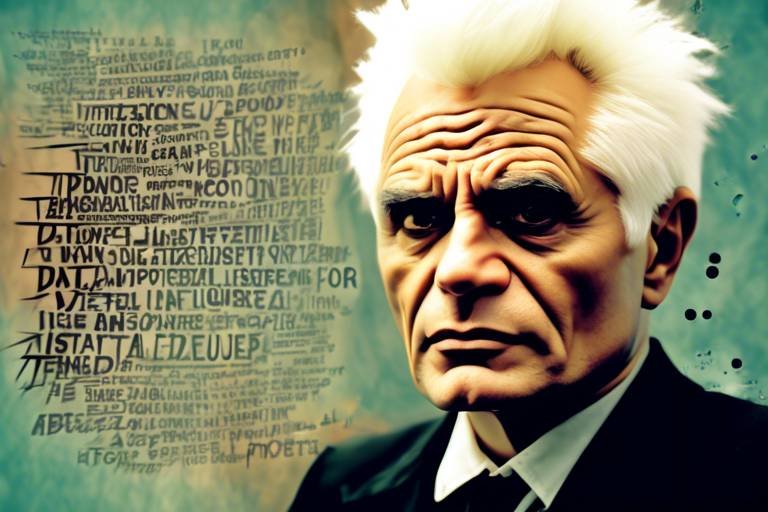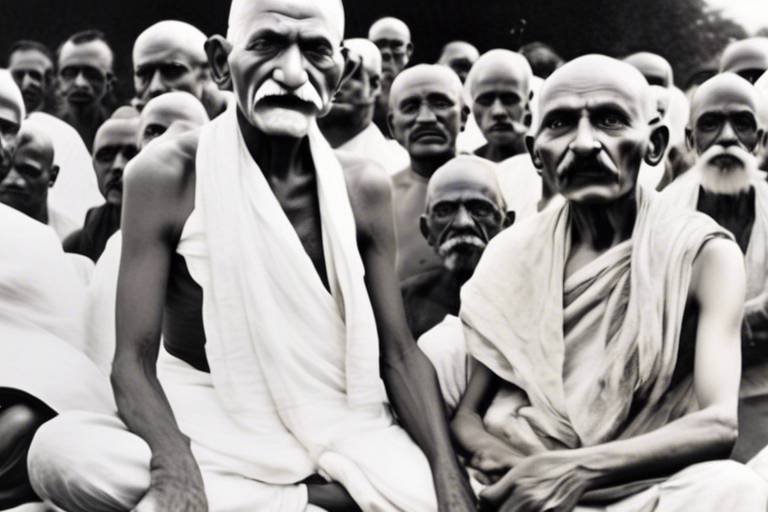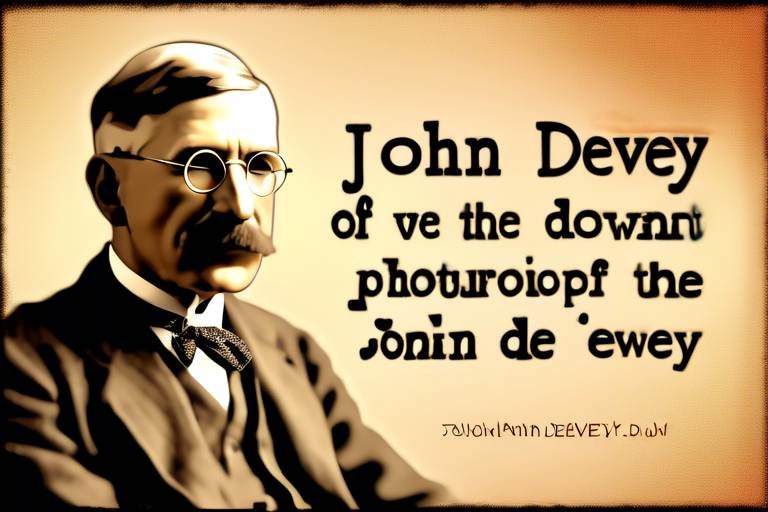Ludwig Feuerbach and the Essence of Christianity
In the realm of philosophical discourse, few figures have sparked as much intrigue and debate as Ludwig Feuerbach. His exploration of the essence of Christianity is not just a critique of religion; it is an invitation to delve deeper into the very fabric of human existence. Feuerbach's work challenges us to reconsider our understanding of faith, spirituality, and the nature of God. By examining his ideas, we embark on a journey that questions not only the divine but also the essence of humanity itself.
Feuerbach's approach is refreshingly human-centric. He proposes that rather than viewing God as an external, omnipotent being, we should see the divine as a reflection of our own innate qualities and desires. This perspective shifts the focus from the heavens to our hearts and minds, urging us to recognize that the attributes we ascribe to God—such as love, wisdom, and power—are, in fact, projections of our own human experiences. In this sense, Feuerbach's philosophy serves as a mirror, reflecting not just the divine but also the profound aspects of our humanity.
As we navigate through Feuerbach's thoughts, we find ourselves grappling with essential questions: What does it mean to be human? How do our relationships shape our understanding of faith? And ultimately, how does love serve as the cornerstone of our spiritual lives? Feuerbach argues that the essence of Christianity lies in the principle of love, which he believes is the true manifestation of divine presence among us. This radical rethinking of spirituality invites us to move beyond dogmatic rituals and instead embrace a more humanistic approach to our beliefs.
In the following sections, we will explore Feuerbach's background and philosophy, his critique of traditional theological thought, and the implications of his ideas for modern spirituality. We will delve into the anthropomorphic nature of religious beliefs, the significance of community, and the enduring impact of his legacy on contemporary philosophy. As we unravel these themes, we will also consider the criticisms that have emerged in response to his theories, ultimately reflecting on their relevance in today's world.
- What is Feuerbach's main argument about God? Feuerbach argues that God is a projection of human qualities and desires, rather than a separate, divine entity.
- How does Feuerbach's philosophy differ from traditional theology? Unlike traditional theology, which views God as an external being, Feuerbach emphasizes a human-centered approach that prioritizes love and community.
- What impact did Feuerbach have on modern philosophy? Feuerbach's ideas have influenced various movements, including existentialism and humanism, encouraging a reevaluation of faith and spirituality.
- What criticisms have been made against Feuerbach's theories? Critics argue that Feuerbach's reduction of God to human projections may overlook the complexities of religious experience and the divine.

Feuerbach's Background and Philosophy
Ludwig Feuerbach, born on July 28, 1804, in Landshut, Bavaria, was a pivotal figure in the transition from idealism to materialism in philosophical thought. His early life was shaped by the rigorous academic environment of his father, a Lutheran pastor, and his exposure to the intellectual currents of the time, particularly the influence of Georg Wilhelm Friedrich Hegel. Initially, Feuerbach was a devout follower of Hegelian philosophy, which emphasized the role of the absolute spirit and idealism. However, as he delved deeper into philosophical inquiry, he began to question the validity of Hegel’s abstract concepts.
This intellectual journey led Feuerbach to develop a more materialist and anthropological perspective on religion and humanity. He argued that the essence of religion is not found in the supernatural but in the human experience itself. This marked a significant shift in his thinking, as he sought to uncover the underlying human desires and needs that shape religious beliefs. Feuerbach's critique of religion was grounded in the idea that God is not an independent entity but rather a projection of human qualities and aspirations.
Feuerbach's seminal work, The Essence of Christianity, published in 1841, serves as a cornerstone of his philosophical framework. In this text, he posits that the attributes we ascribe to God—such as love, wisdom, and power—are actually reflections of our own human nature. Thus, he challenges the traditional notions of God and religion by suggesting that they are merely a mirror of our own desires. This radical perspective not only critiques the foundations of religious belief but also invites individuals to reconsider their understanding of spirituality and faith.
Feuerbach's philosophy can be summarized in several key ideas:
- Humanism: He emphasized the importance of human beings and their experiences over abstract theological concepts.
- Projection Theory: The idea that God is a projection of human traits and aspirations, reshaping our understanding of divinity.
- Critique of Idealism: A rejection of Hegelian idealism in favor of a more tangible, materialist approach to understanding existence.
His ideas laid the groundwork for later thinkers, influencing movements such as existentialism and humanism. Feuerbach's emphasis on the human condition and the social aspects of religion invites us to explore the deeper connections between faith, community, and personal experience. As we unpack his philosophy, we begin to see how his insights challenge us to rethink not just religion, but the very essence of what it means to be human.

The Concept of God as Projection
Ludwig Feuerbach's philosophical journey takes a fascinating turn when he introduces the idea that the concept of God is fundamentally a projection of human qualities and desires. This assertion not only challenges traditional notions of divinity but also invites us to reconsider what we believe about ourselves. Imagine looking into a mirror and seeing not just your reflection but an entire universe of hopes, fears, and aspirations staring back at you. Feuerbach argues that this is precisely how humanity has constructed the idea of God—by projecting our own characteristics onto a divine figure.
At its core, this idea reshapes our understanding of both divinity and human nature. Instead of viewing God as an external, transcendent being, Feuerbach encourages us to see God as a mirror reflecting our deepest yearnings. This perspective leads to some profound implications for spirituality. For instance, if God embodies love, compassion, and justice, it raises the question: are these qualities inherent to God, or do they stem from our own human experience? Feuerbach's critique suggests that our understanding of the divine is inextricably linked to our own nature.
Feuerbach's assertion also highlights the anthropomorphic tendencies in religion. He posits that religious concepts often reflect human attributes, suggesting that our descriptions of God—whether as a loving father, a vengeful judge, or a wise teacher—are merely extensions of our own characteristics. This leads us to ponder: how much of our understanding of God is shaped by cultural and personal experiences? For Feuerbach, the answer is significant; he believes that these projections reveal more about humanity than they do about an actual divine entity.
To illustrate this point further, consider the following table that summarizes key aspects of Feuerbach's projection theory:
| Human Quality | Projected Attribute of God |
|---|---|
| Love | God as a loving figure |
| Justice | God as a just judge |
| Wisdom | God as an omniscient being |
Feuerbach's critique of traditional theological thought further emphasizes how he challenges the foundations of religious belief. By posing the question of whether God exists independently of human consciousness, he invites a radical reevaluation of faith. This leads to a more humanistic approach to spirituality, where the focus shifts from worshiping a distant deity to embracing the qualities that we find within ourselves and each other. Rather than seeking divine approval, we are encouraged to cultivate love, compassion, and understanding in our communities.
In summary, Feuerbach's concept of God as a projection not only reshapes our understanding of the divine but also serves as a mirror reflecting our own humanity. It calls us to recognize that the attributes we ascribe to God are deeply rooted in our own experiences and desires. This realization can be liberating, prompting us to explore spirituality in a way that is more aligned with our human nature and communal relationships. So, next time you think about God, ask yourself: are you seeing the divine, or are you simply looking at a reflection of who you are?
- What does Feuerbach mean by the projection of God? Feuerbach suggests that the characteristics we attribute to God are actually reflections of human qualities and desires.
- How does this concept change our understanding of spirituality? It encourages a more humanistic approach, focusing on love and community rather than dogmatic beliefs.
- What are the implications of viewing God as a projection? It challenges traditional theological arguments and emphasizes the importance of human relationships in understanding faith.

Anthropomorphism in Religion
When we think about religion, it's hard to ignore the human traits that often seep into our understanding of the divine. Anthropomorphism, the practice of attributing human characteristics to non-human entities, plays a significant role in how we perceive God and other religious figures. Ludwig Feuerbach argues that this tendency isn't just a quirk of human imagination; rather, it's a fundamental aspect of how we construct our beliefs. By placing human attributes onto divine beings, we create a God that reflects our own desires, fears, and emotions.
This projection of human qualities onto God can be seen in various religious texts and doctrines. For instance, many religions describe God as loving, jealous, or vengeful—traits that are inherently human. This leads us to ponder: if God is merely a reflection of humanity, what does that say about our own nature? Feuerbach suggests that by examining these anthropomorphic representations, we can glean insights into our own psyche and societal values. Instead of viewing God as a distant, abstract concept, we begin to see Him as a mirror reflecting our own qualities and struggles.
Moreover, anthropomorphism shapes our understanding of morality and ethics within a religious context. When we envision God as a figure who embodies love and compassion, we are more likely to adopt those values ourselves. This creates a cycle where our perception of the divine influences our behavior and, in turn, our societal norms. Feuerbach posits that this connection is crucial; it suggests that the essence of religion is not found in dogma but in our shared human experience.
Consider the following aspects of anthropomorphism in religion:
- Personification of Deities: Many cultures depict their gods with human-like features and emotions, making them relatable to followers.
- Emotional Engagement: By attributing human emotions to God, believers often feel a deeper connection and are more likely to engage in spiritual practices.
- Moral Framework: The traits we assign to God often shape our understanding of right and wrong, influencing ethical behavior in society.
In summary, Feuerbach's exploration of anthropomorphism reveals that our understanding of the divine is intricately tied to our human experience. By recognizing this connection, we can better understand not only our beliefs but also the broader implications of how we relate to each other and the world around us. So, the next time you think about God, ask yourself: are you seeing a reflection of your own humanity?

Critique of Theological Thought
Ludwig Feuerbach's critique of theological thought is nothing short of revolutionary. He boldly challenges the very foundations upon which traditional religious beliefs are built. At the heart of his argument lies the assertion that much of what we consider divine is actually a reflection of human needs and desires. Rather than seeing God as an external, transcendent being, Feuerbach invites us to view the divine as a mirror that reflects our own nature. This perspective not only reshapes our understanding of God but also raises profound questions about the validity of established theological doctrines.
Feuerbach's critique can be summarized through several key points:
- The God of Theology is Human-Centric: Feuerbach argues that the attributes ascribed to God—such as love, wisdom, and justice—are essentially human qualities. This anthropocentric view posits that humans project their best traits onto a divine figure, thereby creating a God that embodies their ideals.
- Religious Dogma vs. Human Experience: He contends that religious dogma often stands in stark contrast to the lived experiences of individuals. By prioritizing dogmatic beliefs over genuine human experiences, traditional theology risks alienating individuals from their own emotional and spiritual realities.
- The Role of Fear and Desire: Feuerbach emphasizes that much of religious belief is rooted in fear—fear of the unknown, fear of death, and the desire for immortality. This reliance on fear and desire to uphold faith raises questions about the authenticity of such beliefs.
In essence, Feuerbach dismantles the traditional theological arguments that have been used to justify faith in God. He critiques the ontological argument, which posits that God’s existence is self-evident, by suggesting that existence itself is not a predicate. He also challenges the moral argument, which claims that morality necessitates a divine lawgiver, by asserting that human beings are capable of creating ethical frameworks independent of any divine influence. By exposing these weaknesses in theological thought, Feuerbach paves the way for a more humanistic understanding of spirituality.
Ultimately, Feuerbach's critique is not merely an attack on religion; it is an invitation to reconsider the very essence of faith. He encourages a shift from a focus on divine authority to an emphasis on human relationships and community. This approach fosters a spirituality grounded in love, empathy, and mutual support, challenging us to redefine what it means to be religious in a contemporary context.
- What is Feuerbach's main argument against traditional theology?
Feuerbach argues that God is a projection of human qualities and desires, suggesting that many theological concepts reflect our own nature rather than an external divine being. - How does Feuerbach view the concept of love in Christianity?
He posits that love is central to Christianity, advocating for a more humanistic approach to spirituality that emphasizes relationships over dogma. - What impact did Feuerbach have on modern philosophy?
Feuerbach's ideas have significantly influenced existentialism and humanism, encouraging discussions on the nature of faith and ethics in contemporary society.

The Essence of Christianity
When we dive into the essence of Christianity, we uncover layers of meaning that go beyond mere doctrine or ritual. Ludwig Feuerbach, a keen philosopher of the 19th century, argued that the true heart of Christianity lies not in its dogmas but in the profound human connections it fosters. He believed that at its core, Christianity is about love, community, and the intricate web of human relationships that bind us together. This perspective invites us to rethink what it means to practice faith in a world that often feels fragmented and disconnected.
Feuerbach's interpretation centers on the idea that love is the fundamental essence of Christianity. He posits that love transcends the confines of religious laws and rituals, serving as a bridge that connects individuals to one another. In this context, love is not merely an emotion; it is a powerful force that shapes our interactions and our understanding of the divine. When we love, we are embodying the very principles that Jesus taught, reflecting the nature of God through our actions and relationships.
Moreover, the concept of community plays a vital role in Feuerbach's vision of Christianity. He emphasizes that faith is not an isolated experience but rather a communal journey. The church, in this light, transforms from a mere institution into a vibrant community where individuals come together to support, uplift, and nurture one another. This sense of belonging is crucial, as it creates a space where love can flourish, allowing people to experience the divine through their connections with others. In a world often marked by individualism, Feuerbach's insights remind us that our spiritual growth is intertwined with our relationships.
To further illustrate this, consider the following table that summarizes Feuerbach's views on the essence of Christianity:
| Element | Description |
|---|---|
| Love | At the core of Christian faith, love fosters connection and reflects divine qualities. |
| Community | A supportive environment where individuals nurture each other's spiritual journeys. |
| Human Relationships | Interpersonal connections are essential for understanding and experiencing faith. |
In conclusion, Feuerbach's perspective on the essence of Christianity challenges us to look beyond traditional interpretations. By focusing on love and community, we can cultivate a more profound and meaningful faith that resonates with our everyday lives. This approach not only enriches our spiritual experience but also encourages us to actively participate in the creation of a more compassionate and connected world.
- What is the main idea behind Feuerbach's critique of Christianity?
Feuerbach argues that God is a projection of human qualities, suggesting that the essence of Christianity lies in human relationships and love rather than in dogmatic beliefs.
- How does Feuerbach view the role of community in Christianity?
He emphasizes that community is essential for spiritual growth, as it provides support and fosters relationships that embody the core values of love and compassion.
- Can Feuerbach's ideas be applied to modern spirituality?
Yes, his insights encourage a more humanistic approach to spirituality, focusing on love and community, which are relevant in today's diverse and often fragmented society.

Love as Central to Faith
When we dive into the heart of Christianity, we find that love isn't just an accessory; it's the very essence of the faith. Ludwig Feuerbach, in his exploration of religious philosophy, emphasized that love is the core principle that binds humanity to the divine. This idea challenges traditional dogmas that often prioritize ritual and doctrine over genuine human connection. Imagine love as the glue that holds everything together, a vibrant force that transcends the boundaries of mere belief and transforms faith into a lived experience.
Feuerbach argued that the divine is not an abstract concept but rather a reflection of our deepest human desires and qualities. In this sense, love becomes a universal language that everyone can understand, regardless of their background or beliefs. It invites us to step outside of ourselves and connect with others on a profound level. This notion of love as central to faith reshapes our understanding of spirituality, urging us to prioritize relationships over rituals. After all, what good is faith if it doesn't foster compassion and kindness among people?
In his view, the teachings of Jesus exemplify this idea beautifully. Jesus' message was not merely about following rules but about embracing love as a way of life. Feuerbach posits that when we love one another, we are embodying the very essence of the divine. This perspective encourages a shift from a transactional view of faith—where one believes to gain favor from God—to a more relational approach that emphasizes community, empathy, and mutual support.
Furthermore, this love is not limited to romantic or familial bonds; it extends to our fellow human beings, creating a sense of community that is essential for a fulfilling spiritual life. Feuerbach believed that when individuals come together with love as their guiding principle, they can create a supportive environment that nurtures personal growth and collective well-being. In this way, love becomes a catalyst for social change, inspiring people to work together for the common good.
To illustrate this concept further, consider the following table that outlines the key differences between a dogmatic approach to faith and a love-centered approach:
| Dogmatic Approach | Love-Centered Approach |
|---|---|
| Focus on rules and rituals | Focus on relationships and connections |
| Emphasis on individual salvation | Emphasis on communal well-being |
| Fear-based motivation | Love-based motivation |
| Exclusivity | Inclusivity |
This table highlights how a love-centered approach to faith not only fosters a deeper understanding of spirituality but also encourages a more inclusive and compassionate community. It invites us to reassess our beliefs and consider how we can embody love in our daily lives. Are we reaching out to others with kindness? Are we prioritizing love in our interactions, or are we getting lost in the complexities of doctrine?
Ultimately, Feuerbach's assertion that love is central to faith invites us to embrace a more humanistic approach to spirituality. It encourages us to recognize that our connections with others are not just an extension of our faith but are, in fact, the very foundation of it. By prioritizing love, we can transform our understanding of what it means to be spiritual beings, fostering a sense of belonging that transcends mere belief.
- What did Feuerbach mean by love being central to faith? Feuerbach believed that love is the essence of Christianity, emphasizing that genuine human connections are more important than rituals or dogmas.
- How does a love-centered approach change our understanding of religion? It shifts the focus from rules and individual salvation to community, empathy, and mutual support, encouraging a more inclusive spiritual practice.
- Can love be seen as a universal concept in all religions? Yes, many religions emphasize love in their teachings, making it a common thread that can unite various faiths and promote understanding among different cultures.

Humanity and Community
In the realm of Ludwig Feuerbach's philosophical discourse, the concepts of humanity and community emerge as essential pillars that support his critique of religion, particularly Christianity. Feuerbach believed that genuine faith transcends dogma and instead cultivates a sense of belonging and mutual support among individuals. He argued that the essence of Christianity is not found in rigid doctrines or rituals but in the rich tapestry of human relationships and the love that binds us together. This perspective invites us to reconsider the role of community in our spiritual lives and the ways it enriches our understanding of what it means to be human.
Feuerbach's emphasis on community is particularly relevant in today's world, where many people find themselves isolated or disconnected from one another. He posited that a true understanding of faith is rooted in our interactions with others, suggesting that the divine is not an abstract concept residing in the heavens but rather a reflection of our shared experiences and emotions. This idea resonates deeply in our contemporary society, where the search for connection and understanding often leads individuals to seek out communities that reflect their values and beliefs.
Moreover, Feuerbach's anthropological approach to religion highlights how communal bonds can foster a sense of purpose and belonging. He believed that when people come together, they create a space for love and compassion to flourish. This communal aspect of faith encourages individuals to support one another, share their struggles, and celebrate their joys. In essence, the community becomes a living embodiment of the love that Feuerbach deemed central to true Christianity.
To illustrate this point further, consider the following aspects of community that Feuerbach advocates:
- Shared Values: Communities often form around common beliefs and values, creating a sense of unity and purpose.
- Mutual Support: In a strong community, individuals support one another through life's challenges, fostering resilience and strength.
- Collective Growth: Communities provide an environment for personal and spiritual growth, encouraging members to learn from each other.
In conclusion, Feuerbach's ideas about humanity and community challenge us to rethink how we engage with our faith. Rather than viewing religion as a solitary path, he encourages us to embrace the communal aspects of spirituality. By fostering connections with others and recognizing the divine in our shared humanity, we can cultivate a more profound and meaningful understanding of our beliefs. This shift not only enriches our spiritual lives but also contributes to a more compassionate and interconnected world.

Impact on Modern Philosophy
Ludwig Feuerbach's influence on modern philosophy is profound and far-reaching, touching various schools of thought and prompting critical discussions about religion, humanity, and ethics. His radical ideas challenged the status quo of theological perspectives and opened the door for existentialism and humanism, movements that prioritize human experience and rationality over divine authority. Feuerbach's assertion that God is a projection of human qualities has led many philosophers to reconsider the nature of divinity and its relationship to human existence.
One of the most significant impacts of Feuerbach's thought is the shift towards a more human-centered philosophy. By emphasizing human emotions, desires, and relationships as central to understanding spirituality, he laid the groundwork for later thinkers who would further explore these themes. Philosophers like Karl Marx, Friedrich Nietzsche, and Jean-Paul Sartre drew inspiration from Feuerbach’s critique of religion, each in their unique way, challenging the idea of an external deity and advocating for a more immanent understanding of human existence.
For instance, Marx adopted Feuerbach's materialist perspective, suggesting that religion is a product of social and economic conditions, serving as a tool for oppression. This idea resonates with contemporary discussions around the social implications of belief systems and how they can be both a source of comfort and a means of control. Similarly, Nietzsche’s famous proclamation that "God is dead" reflects a rejection of traditional religious values, emphasizing the need for individuals to create their own meaning in a secular world.
In addition to existentialism, Feuerbach's ideas have also influenced humanistic psychology. Thinkers like Carl Rogers and Abraham Maslow emphasized the importance of love, self-actualization, and interpersonal relationships, echoing Feuerbach's assertion that love is fundamental to human experience. This intersection of philosophy and psychology has led to a more nuanced understanding of the human condition, where spirituality is often seen as an integral part of personal growth and community well-being.
Moreover, Feuerbach's critique has sparked debates within the realm of ethics. His focus on human relationships and communal love challenges traditional moral frameworks that often prioritize divine commandments over human welfare. This shift has encouraged modern ethicists to consider the consequences of actions on individuals and communities, promoting a more empathetic and relational approach to moral philosophy.
In summary, Ludwig Feuerbach's impact on modern philosophy cannot be overstated. His ideas continue to resonate in contemporary discussions about faith, ethics, and the essence of what it means to be human. By shifting the focus from the divine to the human, Feuerbach has paved the way for a more inclusive and compassionate understanding of spirituality that remains relevant today.
- What are the main ideas of Ludwig Feuerbach? Feuerbach argued that God is a projection of human qualities and desires, emphasizing love and community as central to understanding religion.
- How did Feuerbach influence existentialism? His critique of religion laid the groundwork for existential thinkers who prioritized human experience and questioned the existence of a divine being.
- What is the significance of love in Feuerbach's philosophy? Feuerbach posited that love is the core of Christianity, advocating for a more humanistic approach to spirituality that focuses on relationships.
- How did Feuerbach's ideas impact modern ethics? His emphasis on human relationships challenged traditional moral frameworks, promoting a more empathetic and relational approach to ethics.

Criticisms of Feuerbach's Ideas
Ludwig Feuerbach's philosophical critiques have sparked significant debate, and while his insights into religion and human nature are compelling, they are not without their detractors. Critics argue that Feuerbach's perspective, which frames God as merely a reflection of human desires, oversimplifies the complexities of religious belief and the divine. One of the main points of contention is that by reducing God to a projection of human qualities, Feuerbach may inadvertently strip away the profound and transcendent aspects of spirituality that many believers experience.
For instance, opponents of Feuerbach often highlight the following criticisms:
- Oversimplification of Belief: Critics argue that Feuerbach's reductionist view fails to account for the rich tapestry of religious experience that includes mystery, awe, and transcendence.
- Neglect of the Supernatural: By focusing solely on human attributes, Feuerbach overlooks the possibility that the divine may exist independently of human conception.
- Inadequate Treatment of Faith: Some assert that Feuerbach's anthropological approach neglects the personal and communal dimensions of faith that go beyond mere projection.
Moreover, Feuerbach's emphasis on love and human relationships as the essence of Christianity has been critiqued for potentially diminishing the role of traditional doctrines and rituals that many find essential to their faith. Critics argue that while love is undeniably a central tenet of Christianity, it cannot encapsulate the entirety of the religious experience, which often includes complex theological beliefs and practices that have been developed over centuries.
Another significant critique comes from those who argue that Feuerbach's philosophy may lead to a form of nihilism or moral relativism. If God is merely a construct of human desires, what then is the foundation for morality? This question raises concerns about the implications of Feuerbach's ideas for ethical frameworks, as they may suggest that morality is equally subjective and fluid, rather than anchored in an objective divine standard.
Additionally, Feuerbach's ideas have been challenged from a historical perspective. Some scholars argue that his analysis does not adequately consider the historical and cultural contexts in which religions developed. By viewing religion primarily through the lens of human psychology, Feuerbach may miss the intricate ways in which various faiths have evolved in response to specific social, political, and economic factors.
In summary, while Feuerbach's critiques have undeniably influenced modern thought, they also invite a range of criticisms that highlight the complexities and nuances of religious belief. As we navigate the landscape of faith and spirituality, it's crucial to engage with these critiques thoughtfully, recognizing that the relationship between humanity and the divine is multifaceted and deeply personal.
- What are the main criticisms of Feuerbach's theory? Critics argue that his reductionist view oversimplifies religious belief and neglects the supernatural aspects of God.
- How does Feuerbach's philosophy impact our understanding of morality? Some fear that his ideas may lead to moral relativism, as they suggest that morality could be subjective.
- Does Feuerbach's critique consider historical contexts? Critics suggest that Feuerbach's analysis may overlook the historical and cultural factors that shape religious beliefs.

Conclusion: Relevance Today
In today's fast-paced world, the ideas of Ludwig Feuerbach resonate more than ever. His profound critique of religion and exploration of human nature challenge us to rethink our beliefs and the role of spirituality in our lives. As society grapples with issues of faith, community, and personal identity, Feuerbach's insights provide a refreshing lens through which to examine our own convictions.
Feuerbach's assertion that the concept of God is a projection of human qualities encourages us to reflect on what we truly value. Are our beliefs shaped by our desires and experiences? This question invites a deeper understanding of ourselves and the motivations behind our spiritual practices. In a world where individualism often reigns, his emphasis on love and community serves as a powerful reminder of the importance of connection and mutual support in our journeys.
Moreover, Feuerbach's humanistic approach to spirituality is particularly relevant today as we navigate a landscape filled with diverse beliefs and ideologies. His critique of dogmatic religious frameworks opens the door for more inclusive and empathetic discussions about faith. By prioritizing love and humanity over rigid doctrines, we can foster environments where people feel valued and understood, regardless of their backgrounds.
As we reflect on Feuerbach's legacy, it becomes clear that his thoughts can inform contemporary debates around ethics and morality. His ideas have paved the way for movements such as existentialism and humanism, which continue to shape philosophical discourse. In a time when many seek meaning and purpose, revisiting Feuerbach's work can inspire a more profound connection to our collective human experience.
In conclusion, Ludwig Feuerbach's critique of religion is not merely an academic exercise; it is a call to action. It encourages us to engage with our beliefs critically and compassionately. As we navigate our spiritual paths, let's remember the essence of what it means to be human—our capacity for love, connection, and understanding. In doing so, we can cultivate a more inclusive and compassionate world.
- What is the main idea of Feuerbach's philosophy? Feuerbach's philosophy centers on the idea that God is a projection of human qualities and desires, emphasizing the importance of love and community in understanding faith.
- How does Feuerbach's critique of religion apply today? His critique encourages a more humanistic approach to spirituality, promoting empathy and connection over rigid dogma, which is particularly relevant in today's diverse society.
- What impact did Feuerbach have on modern philosophy? Feuerbach influenced existentialism and humanism, encouraging discussions around ethics, morality, and the human experience in contemporary philosophical thought.
Frequently Asked Questions
- Who was Ludwig Feuerbach?
Ludwig Feuerbach was a German philosopher born in 1804, known for his critiques of religion and his influential ideas that shifted from Hegelian idealism to a more human-centered perspective. He emphasized the importance of human nature and relationships in understanding religion, particularly Christianity.
- What is Feuerbach's main argument about God?
Feuerbach argued that the concept of God is essentially a projection of human qualities and desires. He believed that rather than being an external being, God reflects our own nature, aspirations, and emotions, which fundamentally reshapes how we understand divinity and ourselves.
- How does Feuerbach view love in Christianity?
Feuerbach posits that love is the core essence of Christianity. He suggests that true faith should be rooted in love and community rather than dogmatic beliefs. This perspective promotes a more humanistic approach to spirituality, emphasizing relationships over rigid doctrines.
- What impact did Feuerbach have on modern philosophy?
Feuerbach's ideas have significantly influenced various philosophical movements, including existentialism and humanism. His critiques of religion and the nature of God have sparked discussions that continue to resonate in contemporary debates about ethics, spirituality, and the human condition.
- What are some criticisms of Feuerbach's theories?
While Feuerbach's theories have been impactful, they have also faced criticism. Some argue that his reduction of God to mere projection overlooks the complexities of religious experience and the transcendent aspects of faith. Critics also point out potential limitations in his anthropological approach to spirituality.
- How are Feuerbach's ideas relevant today?
Feuerbach's insights remain relevant as they encourage individuals to reflect on their beliefs and the nature of faith. In a world where spirituality is increasingly examined through a personal lens, his emphasis on love, community, and human relationships continues to inspire discussions about the essence of religion.



















